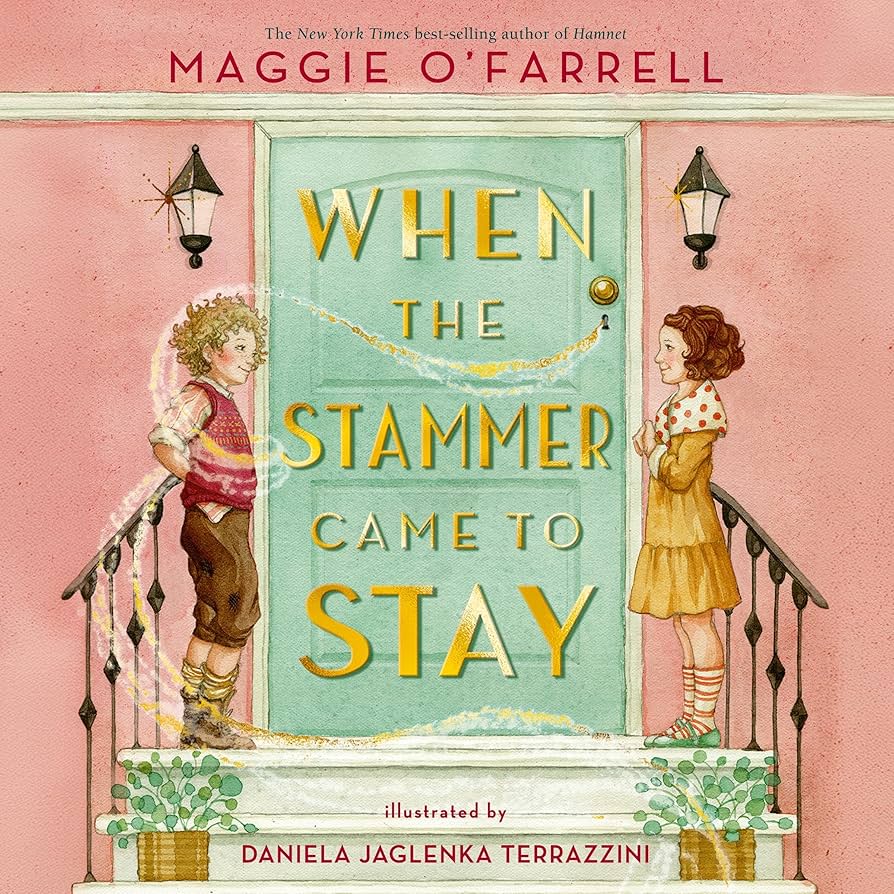 Award-winning novelist Maggie O’Farrell was in the news in late 2024 with the publication of her children’s book When the Stammer Came to Stay, which has received rave reviews on both sides of the Atlantic. It is the author’s third children’s book.
Award-winning novelist Maggie O’Farrell was in the news in late 2024 with the publication of her children’s book When the Stammer Came to Stay, which has received rave reviews on both sides of the Atlantic. It is the author’s third children’s book.
Her career as a novelist took off when her first work in 2001, After You’d Gone, won the Betty Trask Award. Her novel The Hand That Held Mine won the 2010 Costa Novel Award. In addition, she was twice shortlisted for the Costa Novel Award with Heatwave (2014) and This Must Be the Place (2017). Her memoir I am, I am, I am: Seventeen Brushes with Death topped the Sunday Times bestsellers list. O’Farrell’s novel Hamnet won the Women’s Prize for Fiction in 2020, in addition to the fiction prize at the 2020 National Books Critics Circle Awards; Hamnet will be released as a movie in 2025 starring Jessie Buckley and Paul Mescal and directed by Chloe Zhao. Her novel The Marriage Portrait was shortlisted for the 2023 Women’s Prize for Fiction.
 The celebrated author penned an essay about growing up Irish in Great Britain in the November 22, 2024 edition of the Irish Times that carried the headline, “Author Maggie O’Farrell: I had a teacher at school who took the register, saw my name and said to me, 'Are your family in the IRA?'. She wrote, “Being Irish in Britain in the 1970s and 1980s wasn’t easy.” In the piece she also addressed how her stammering was anything but easy:
The celebrated author penned an essay about growing up Irish in Great Britain in the November 22, 2024 edition of the Irish Times that carried the headline, “Author Maggie O’Farrell: I had a teacher at school who took the register, saw my name and said to me, 'Are your family in the IRA?'. She wrote, “Being Irish in Britain in the 1970s and 1980s wasn’t easy.” In the piece she also addressed how her stammering was anything but easy:
“I was about seven when I first became conscious that I was stammering. In my child-brain I thought maybe nobody else noticed. Then of course the kids at school started imitating me, and I thought, 'No it’s not just inside my head.' It was painful starting in a new school as a teenager in Scotland. English was one of my favourite subjects and I couldn’t get my words out to read in class. Pronouncing the letter M was hard, which is tricky when your name is Maggie, and you want to read Macbeth out loud in class. I never got any speech therapy as a child, you just got on with it. Much later, I had to talk about one of my books on live radio, my worst nightmare, and I shut down in the middle of talking to Jenni Murray on BBC Radio 4's Woman’s Hour. I did manage to get past it, but I realized I couldn’t go on like that anymore so I got some therapy. The therapist asked me to keep a stammering diary."
"One day I told her about getting a prescription in the chemist and not being able to get my name out. The pharmacist said, 'Oh, have you forgotten your name?' The therapist suggested that next time it happened I should look the person in the eye and say, 'I’ve got a stammer.' So, I practised that, and it helped. If someone reacts badly or laughs, that’s their problem, there’s no shame. You wouldn’t laugh at someone who was limping, would you?”
In a November 2, 2024, article in The Guardian, “Maggie O’Farrell: Having a stammer was instrumental in making me a writer,” she put forth, “Having a stammer has been the single most defining experience of my life. It’s a crippling and agonising affliction, especially if you happen to be a teenager, but I’m certain it was instrumental in making me a writer. Watching words flow from your pen, unchecked, feels like a magic trick to someone who can’t rely on their verbal fluency.”
In a December 10, 2024 article in People magazine, “Maggie O’Farrell Reflects on Stammering in New Kids Book: ‘Don’t Think I Would Be a Writer Without It',” O’Farrell theorized that her stuttering led her to becoming a writer because her stuttering was prominent in guiding her to “rewrite” sentences in her head while speaking, in order to avoid letters or words that might cause her trouble. In the article she explained by saying, “I always have problems with M, which is difficult when your name is Maggie,” O’Farrell says. “You have to launch off a different sound. You are always thinking of about five or six different ways to say the same thing … I don’t think I would be a writer without it.” The act of writing itself, O’Farrell says, was also a liberating experience. "I still remember, as a child, watching my pen moving in these sentences and words just coming out onto the page, and it’s such bliss,” she says. “I still find that amazing, the idea that there's nothing stopping it. I can just say whatever I want, however I want to say it, and I'm not going to have any problems with it, and no one's going to judge me or laugh at me.”
Her life as a person who stutters was examined in-depth in a November 2, 2024 article in the Irish Times titled “Maggie O’Farrell on Living with a Stammer: It’s Still There, It Lurks Beneath” in which she addresses the difficulties her speech caused her in her childhood and adolescence, and how she benefited from speech therapy as an adult. She put forth, “Speech therapists talk about it as an iceberg where only the tip is available to others, but underneath the water there’s this huge, dangerous, jagged mass of ice. I still say that I have a stammer. In my teens I would never have been able to talk to you like I am now. It’s a lot better and I have had speech therapy in adulthood. But I think it’s still there, it still lurks beneath, and I worry about it."
Later in the article she said, “I think it is the thing about my life that has most defined me, defined what I can and can’t do, what kind of job I can do, who I can be friends with... And the thing about a stammer is, it’s unpredictable. You think you’ve got over it and it will come back. Only the other day I was in a pharmacy and I had to pick up a prescription and the woman said, ‘What’s your name?’ And I suddenly couldn’t say it. It is terribly shaming, because people make fun of it. I carried that kind of shame and embarrassment and cringing self-consciousness about it all the way through my life until I had speech therapy when I was 40.”
The Northern Ireland native expounded on her life-changing speech therapy experience in an article in the Sunday Post on November 24, 2024, “My stammer has instinct for good, and not so good, people. It tells me if things are wrong: Maggie O’Farrell on writing the book she wishes she had as a child.” She said of seeking out speech therapy as an adult, “I decided around 12 years ago that I needed to have speech therapy. I was a bit desperate. I had had it for so long and there is very little in life you can do professionally that doesn’t involve speaking. I thought it would be complicated, but it wasn’t. Within a couple of weeks, I had an appointment with a speech therapist while my tiny daughter was asleep in a buggy. The therapist was brilliant. She talked to me about my stammer and asked me to keep a stammering diary.”
When the Stammer Came to Stay was released to highly positive reviews. The story centers on two very different sisters, Bea and Min, and how one morning Min wakes up to find that she has trouble getting her words out. With the compassionate help of her sister Bea, Min learns how to navigate the choppy waters caused by her speech problem in this story of self-acceptance that will resonate with readers.
A glowing five-star review of the children’s book in The Telegraph on November 20, 2024, ended with this high praise: “Her latest book, by contrast, has nothing to spook the horses – and the story’s mix of cozy domesticity and gentle suspense will find much wider appeal. O’Farrell acknowledges that the book turned out to be more personal than she had intended. (“Fiction sometimes has a way of playing a sleight of hand on the writer,” she concedes in an author’s note.) But the result is a touching, beautifully written story which will resonate with readers well beyond its target age group of five-plus.”
In the People article, the Londonderry native said of her new children’s book, “It's very rare in fiction, any kind of fiction, to meet a character with a stammer who's taken seriously. Often, it's played for laughs. We're invited as audiences or readers to laugh at this person who has a kind of verbal disfluency, or we're invited to think of them as weird or weak or nervous or anxious. But actually, stammerers necessarily aren't those things. I wanted to write something which takes a stammer seriously and talks about what exactly it's like and the bad things about it, but also the things that it can possibly give you.”
Maggie O’Farrell is a brave woman who has fought a battle with stuttering her entire life and wants to use her gifts to bring attention to the speech problem and foster a better public understanding of stuttering. Her new children’s book stresses the importance of self-acceptance and conveys a positive attitude. Gone are the dark ages of the not-so-distant past when children who stutter were made to feel ashamed. With the ratio of males who stutter far outnumbering females, Maggie O’Farrell is an important role model for girls and young women struggling with stuttering. Her success with speech therapy as an adult strongly conveys that speech therapy knows no age limits.
Most public libraries gladly accept suggestions from their patrons in terms of which new books to purchase, and new books are usually displayed in a special section. Feel free to make the recommendation to your library to purchase When the Stammer Came to Stay so that it can be read by more people.
From the Winter 2025 Magazine






 Podcast
Podcast Sign Up
Sign Up Virtual Learning
Virtual Learning Online CEUs
Online CEUs Streaming Video Library
Streaming Video Library